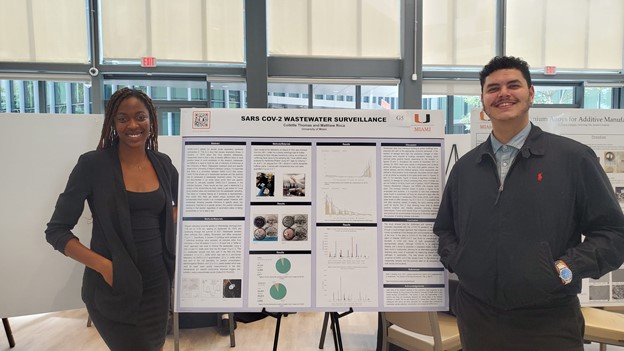Miami-Dade County has found omicron in wastewater, further evidence that the variant is present in the county and circulating.
Tests of wastewater samples in county plants show the concentration of virus includes the omicron variant, said Joshi Raghavender, assistant director of wastewater operations for Miami-Dade Water & Sewer Department.
Along with testing samples from swabs, scientists are studying wastewater because people infected with COVID-19 shed the virus in their stool, even if they aren’t feeling sick and showing symptoms. By collecting wastewater and sending it to a lab for analysis, health officials can get a snapshot of COVID-19′s prevalence in a community.
Roghavender said the University of Miami, which has teamed up with Miami-Dade, confirmed Tuesday that it detected omicron in a sample from the county’s Central District Plant. He suspects Miami-Dade’s two additional plants will find it as well.
It is likely that the samples from the other two plants, North District and South District, also have omicron but we cannot say for sure what the concentration of omicron is in the samples as it has not been quantified.”
Although much remains to be learned about the new variant, what is known about omicron thus far is it is spreading faster than any other previous strain.
The detection of omicron Tuesday in Miami-Dade wastewater further confirms that the variant has arrived in the county.
On Friday, a Miami-Dade lab said it had sequenced the omicron variant in a sample it had analyzed. Aron Banks of CardioPath confirmed omicron in a sample the lab had processed from a hospitalized adult. “The patient was not vaccinated and was admitted for observation to the hospital for conditions unrelated to SARS-CoV-2 and was asymptomatic,” Banks said.
Broward County Water and Wastewater Services does not test for the presence of COVID-19 in its wastewater, according to Alan Garcia, Director of Broward’s Water and Wastewater Services.
In Palm Beach County, the Loxahatchee River Environmental Control District, which provides sewage services for about 100,000 customers in northern Palm Beach County, collects wastewater samples from its treatment facility and sends them to Massachusetts-based Biobot Analytics to determine the presence of the coronavirus.
Biobot’s business development manager Jennings Heussner said his company is sequencing the virus in wastewater from Palm Beach County and 14 other locations in Florida, including counties and universities.
Heussner said while Biobot has seen an uptick in COVID in Florida wastewater, it has not yet confirmed omicron is present but believes it to be. “We’re working on this and hope to be reporting results in the next few days.”
On Monday, Orange County announced it has found the omicron variant in wastewater through tests at two of its three wastewater plants. Altamonte Springs also found the omicron variant in a Thursday sample of sewage from its sewer service area, which encompasses Altamonte Springs, Maitland, unincorporated Seminole County, Winter Park, Eatonville, and parts of Longwood, Scientists are trying to learn how dangerous omicron is when compared with previous variants, both in the severity of illness and ability to evade vaccine protection. Vaccines are expected to offer some protection but an additional booster shot offers maximum immunity.
“I’m telling everyone to get a booster,” said Dr. Daniel Perez, an infectious disease specialist in Plantation. “I think we are more ready than before, with 60% of Florida vaccinated. “I think we will see small waves and omicron will be one. I don’t think it will be like a year ago. We have enough vaccine that I think we will be OK.”
Sun Sentinel health reporter Cindy Goodman can be reached at [email protected] or on Twitter @cindykgoodman



